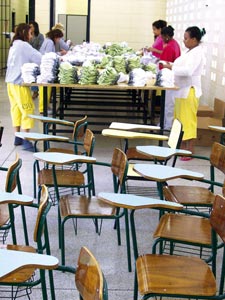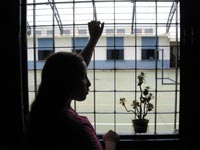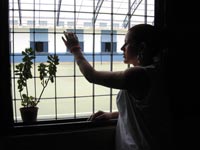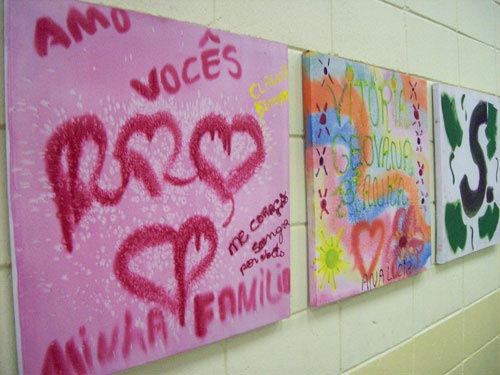Brazil: Reforming prison management
By Carolina Gomma de Azevedo
The UNODC Regional Office for Brazil and the South Cone cooperates with Governments in combating organized crime and corruption and in preventing drug abuse and HIV infection. In 2007, UNODC will also work more closely with the Brazilian Government's National Health Policy for Prisons with a view to improving detainees' access to medical services and basic treatment.
UNODC's Carolina Gomma de Azevedo has been watching closely an innovative prison management programme in Brazil that is in line with United Nations criminal justice standards and norms. As the custodian of these international instruments, UNODC promotes the humane treatment of detainees, the improvement of prison conditions and the use of alternatives to incarceration.

|
| Inmates share communal cells at the Female Resocialization Centre in São Jose do Rio Preto, one of 22 prisons managed by the state in partnership with local NGOs |
When hundreds of high-risk prisoners from the state of São Paulo in Brazil were transferred to maximum-security jails in May 2006, leaders of the notorious prison gang First Command of the Capital ordered their followers to rebel. The powerful gang, one of the largest criminal organizations in the country, led simultaneous riots in more than half the state's prisons and caused mayhem on the streets of the city of São Paulo and its metropolitan area. Days of unrest left 140 people dead, hundreds injured, and dozens of police stations, banks, shops and buses destroyed.
It was not the first time, nor would it be the last, that criminal groups working from prison clashed with state authorities, with violence spilling over to the general population. Once again, a rebellion - the worst ever - exposed the penitentiary system's weaknesses: corruption, underfunding and overcrowding.
There are 131,000 people in the São Paulo prison system and every month the number increases by 1,000. Most of them are low- or medium-risk offenders who are forced to share cells with violent professional criminals. Clearly, living in such a hostile environment is hardly conducive to the offenders' successful reintegration into society.
Human rights first
Not all prisons in São Paulo state face the same challenges and not all are run in the same way: 22 out of a total of 144 facilities are managed by the state in partnership with NGOs. In these centres, the state remains in charge of security and discipline while NGOs are responsible for prison administration and the inmates' welfare.
Within the co-management model, "the state should exercise effective oversight and ensure the services provided to detainees are adequate," says Maurício Kuehne, the Director-General of the National Penitentiary Department (DEPEN).
Professional criminals with a violent history are not allowed at the jointly managed centres.
Inmates are provided with three meals a day, medical and psychological attention, legal assistance, vocational training and educational programmes. They are also encouraged to develop the skills and resources necessary to become law-abiding citizens upon release.
These and other measures introduced at the centres are in line with international standards on the treatment of prisoners and the management of institutions. By contrast, despite Government attempts to improve conditions, regular facilities are often unable to guarantee detainees their fundamental human rights.
Facilities in the co-administration programme stand out for other reasons. "Their resocialization and rehabilitation services are quite innovative in Brazil," says Dr. Fiona Macaulay, lecturer at the Department of Peace Studies at Britain's University of Bradford and former researcher for Amnesty International. She has not seen a similar partnership model anywhere else in the world. According to Dr. Macaulay, who has done extensive research on the Brazilian criminal justice system, NGO staff taking part in this programme are passionate about their work and often bring previous experience as human rights advocates and social workers.
Dr. Nagashi Furukawa, the man who started this prison management model in 1996, believes that everyone benefits from the stronger bonds forged between the community and the prisoners. While he was a juvenile court judge in the city of Bragança Paulista, he worked with people from the community in preventing drug use, violence and health problems among vulnerable groups. "I always listened to what they had to say," he recalls. "And we always had good results."
The prison management alliance between civil society and the state was formalized in January 1996. The Bragança Paulista municipality trained people to start an NGO, which then signed a contract with the city's Public Security Department to manage its penitentiary. When Dr. Furukawa was appointed São Paulo State Secretary for Prison Administration in 1999, he brought the idea along with him and extended it to other prisons.
All the NGOs have close ties with the local community.
Dr. Furukawa says civil society provides better treatment and care for inmates than the state does, improving their chances of giving up crime when they are released. "The rate of reoffending in regular prisons in São Paulo state is as high as 58 per cent. Under the resocialization centre model it is between 3 and 15 per cent."
Making ends meet
The Brazilian co-management model also tackles the problem of under-funding. Citing national data, Macaulay says that state-run prisons cost US$ 458 a month per prisoner, and NGO-run prisons up to $229. This is largely because, as non-profit organizations, NGOs save on taxes, procurement and contractual services.
Some cases of mismanagement have been identified, but DEPEN's Maurício Kuehne says these do not invalidate the model. "I cannot undermine the model because one or other NGO did not work out," he says.
Jointly managed detention facilities have helped to make ends meet by involving the private sector. In 2005, approximately 8,000 prisoners worked from jail for private companies in São Paulo, the largest and richest state in the country.
Several resocialization centres have employment programmes. In Araraquara, for example, detainees work for office furniture suppliers, pet shops, clothing manufacturers, recycling plants and construction companies. In Avaré, they produce toys, tourism maps, footballs and uniforms. In São José dos Campos, female detainees assemble pneumatic valves for industrial and transportation companies. In São José do Rio Preto, inmates sew children's and women's clothes.
Employers pay inmates 75 per cent of the minimum wage and the resocialization institutions the remaining 25 per cent, which the centres use to cover expenses and reinvest in the programme.
Although the pay is not great, many inmates prefer to earn some money rather than none at all so they can help their families and buy essential products for themselves. An additional incentive is that sentences are reduced by one day for every three days of work. Some companies even hire the best upon their release from jail. "I visited the centre in Jaú [outside São Paulo], where prisoners and their families were learning to produce footwear, and the prisoners were able to work after completing their sentences," says Macaulay.
Female Resocialization Centre in São José do Rio Preto
One of the 22 jointly managed centres currently operating in São Paulo is a small custodial facility in the city of São José do Rio Preto that houses up to 210 female inmates. Over 70 per cent of the women here were convicted of drug trafficking. The average age of detainees is 31.
The São José do Rio Preto centre has been managed by the state and the Group to Protect People Living with AIDS (known by its Portuguese acronym GADA) since 2004. They have worked together before. GADA works with the national and municipal HIV/AIDS programmes and with UNODC to prevent drug use and HIV infection.
Since its foundation in 1993, the organization has grown considerably, attracting increasing community involvement and broadening the scope of its work. "We were once an NGO for people living with HIV, now we are an NGO for vulnerable populations," explains Julio Caetano Figueiredo, director and founder of GADA. Sex workers, adolescents, young women and inmates are among the groups they assist mainly through peer-to-peer education.

|
|
Women in São José do Rio Preto pack underwear as part of the penitentiary's employment programme. The hall also serves as a classroom |
In its management of the female penal institution in São José do Rio Preto, GADA relies on the extensive experience it has gained running community-based projects. The organization's staff and volunteers care for inmates in the same way they do for people living with HIV/AIDS. Just as they have always looked for the persons behind the term "HIV-positive," they now refuse to see individuals merely as "offenders" but, rather, as human beings who deserve respect and often need special attention.
The detainees testify to the success of this approach. Like other inmates, 24-year-old Ana spent time in a regular prison before being moved to this resocialization centre, which she prefers: "I feel that I have a real opportunity to change here. I know I cannot fix the past, but I can improve my future. Today I know I can rebuild my life without repeating old mistakes."
Most inmates say they receive excellent treatment in São José do Rio Preto. The time does not hang too heavily as they are always involved in one activity or another - working, studying, gardening or exercising.
Alice's schedule illustrates how busy inmates are. Every morning, she showers, puts on her yellow overalls and joins the others for breakfast. Once the cafeteria has been cleaned up, it becomes the classroom where the women conduct their primary school studies. Alice then goes to work, sewing kids' clothes for export. The 35-year-old woman is serving a six-year term for drug trafficking.
Although each prisoner costs $150 a month or about $5 a day, the institution can still afford to provide good quality food and to have a nutritionist on board. All prisoners have their own bed and share rooms with no more than 11 other women. Some work at the centre as assistants to doctors, dentists and teachers while others help out in the kitchen. Additional programmes include medical and psychological services, education and paid work.
Six companies have signed agreements with the female centre to employ inmates. These include clothing manufacturers Yellow Bug, which produces children's clothes for export to Great Britain, and Loriê, which produces women's underwear that is sold in Brazil, Chile and the United States.
Inmates earn approximately $165 per month, enough to supplement their families' income and buy personal items available at cost prices in the prison shop.
The shop was opened to minimize the time and costs of inspecting the goods female prisoners receive from visitors.
Alternatives to imprisonment
São Paulo has an incarceration rate of 389 detainees per 100,000 inhabitants, well above the national average of 193, partly because courts rarely give non-custodial sentences. Removing the non-violent people from jail would help to reduce over-crowding in mainstream prisons. "Imprisonment is not the solution to all security problems," says DEPEN chief Kuehne.
|
|
For more information, please visit www.unodc.org.br
To download criminal justice tools and handbooks developed by UNODC to assist Member States in implementing UN standards and norms, please go to www.unodc.org/criminal_justice_tools.html
|
|
|
In their paintings, inmates express their love and longing for family. Throughout the rehabilitation process, they are encouraged to develop stronger bonds with their families and communities |
Ana, 24
At the age of 11, I started working as a prostitute. Three years later, I got pregnant from an unknown father. So I did not think twice when I met a man who offered both of us a home. Things got worse when, during my pregnancy, I found out I was HIV-positive. My husband, who was addicted to drugs, beat me up a lot. He was later imprisoned. Since I was unemployed, lacked education and had two kids to feed, I went back to prostitution. Although I hated it, I could not find any other way to survive.
 My problems and low self-esteem pushed me to alcohol. I drank so much that I lost the pleasure of living. Once when I was completely drunk, I got into a fight with a young man. Without thinking, I shot the man. and although I only wanted to scare him, he is now a quadriplegic. I went to trial and was sentenced to 14 years in prison. Only then, in court, did I realize the seriousness of what I had done and how sad my destiny would be from that moment on.
My problems and low self-esteem pushed me to alcohol. I drank so much that I lost the pleasure of living. Once when I was completely drunk, I got into a fight with a young man. Without thinking, I shot the man. and although I only wanted to scare him, he is now a quadriplegic. I went to trial and was sentenced to 14 years in prison. Only then, in court, did I realize the seriousness of what I had done and how sad my destiny would be from that moment on.
In prison, I felt like my life had ended. All I wanted was for death to come and save me. I knew I had to pay for my crime but, in that place, I would not have survived. I saw daily fights and riots, and was treated like an animal. I decided to write a letter to the Female Resocialization Centre in São José do Rio Preto, sharing my story and asking them to take me in. And they did. When I got to the centre, it felt like heaven. Here I can study and work, and I receive good food and health care. There is a real opportunity to change here. I know I cannot fix the past, but I can improve my future. Today I know I can rebuild my life without repeating old mistakes.
Alice, 35
 In 2003, I moved in with a 28-year-old guy I had fallen for a few months before. It was a stable relationship that lasted for a year and a half.
In 2003, I moved in with a 28-year-old guy I had fallen for a few months before. It was a stable relationship that lasted for a year and a half.
This man was addicted to drugs and started selling them. In the beginning, I accepted the situation because I was in love. However, it did bother me. He promised to stop and asked for my help, but he never really changed. When I decided to end the relationship, he stabbed me five times in the face, arms and head. To save my life, I pretended to be dead. Despite several operations, the effects are still with me.
Out of financial necessity, I started dealing drugs in 2005. That year, the police caught me selling and put me in jail. I am now serving a six-year sentence in a resocialization centre.
Despite everything that has happened, I am psychologically well. I work, study and learn to live with my limitations. I am paying for my crime, hoping for my freedom and a new life. I also long for justice to prevail because the man who attacked me is still free. He is not paying for the mistakes he has made.
Vitória, 31
I come from a very poor family. Growing up, we were always hungry. My mother is addicted to alcohol and drugs. She lives on the streets, begging for change to survive. I have four brothers who are also addicted to drugs.
When I was 12, an old guy bought some beers for my mom and, while she drank, he told her that he would take me for a walk. He beat me up and raped me. Only God knows how I feel when I think about this.
By the age of 15, I was a single mother with a daughter. Then I met a young man and thought I had found happiness. We had three kids and lived in peace for five years, until the beatings started. Once, he hit me in the mouth with a tile and I lost my front teeth.
Later, he became a drug dealer. To my surprise, when the police arrived at our home, he told them the drugs were mine. I was sentenced to three years in prison. When I got out of jail a year and a half later, I took my kids, who were with him at the time, and went to live with my mother in a shantytown. Since I could not find a decent job, I started dealing drugs. Soon, I was arrested again and my kids went to a shelter. I haven't seen my kids in a year now, and it hurts too much.
 Carolina Gomma de Azevedo, Communications Assistant at the UNODC Regional Office for Brazil and the South Cone, is a journalist with an MSc in Development Studies from the London School of Economics and Political Science. She is based in Brasilia.
Carolina Gomma de Azevedo, Communications Assistant at the UNODC Regional Office for Brazil and the South Cone, is a journalist with an MSc in Development Studies from the London School of Economics and Political Science. She is based in Brasilia.